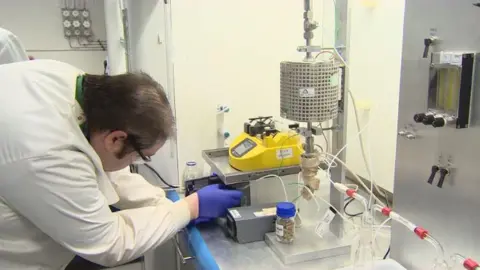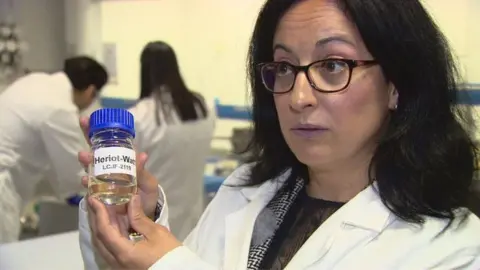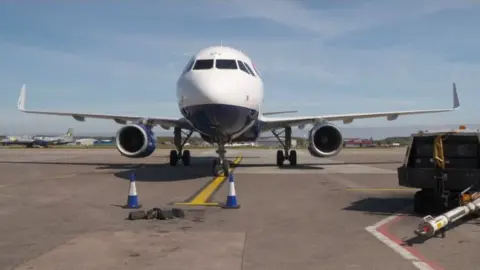Scientists making 'aviation fuel of the future' in Scotland
 BBC
BBCThe aviation fuel of the future could be made in Scotland - with scientists working to create an environmentally-sustainable replacement.
The fuel is made from waste wooden pellets which are heated, turned into a gas and mixed with other ingredients.
A team from Heriot-Watt University is close to working with a major airline on piloting the biomass fuel.
It comes as Scottish and UK ministers prepare to receive fresh advice on when to aim for net-zero carbon emissions.
The Edinburgh-based university is one of three which are through to the finals of a British Airways competition to create a green fuel which can carry 300 passengers on a long-haul flight.

Prof Mercedes Maroto-Valer, who is leading the project, told BBC Scotland's The Nine: "We are really addressing global challenges and finding solutions for decreasing carbon dioxide emissions.
"The aviation sector in particular is increasing its CO2 emissions and what we want is to help them to find the fuels of the future that will be sustainable.
"What we have demonstrated over the last three years is that our process is viable, that it actually works and produces aviation fuel lower in CO2 emissions than current fuels, and we're now ready to jump into the next stage."
The competition was launched by the airline in November and various rounds of judging have placed Heriot-Watt in the final three.
It is competing with University College London and The London School of Economics for the £25,000 prize and a commitment to help develop the solution further.
Only a small quantity of the fuel has been created so far with the lab equipment available, but vast quantities would be needed to make the long-haul journey.
Global leadership
Associate Professor Dr John Andresen said: "There will be no difference between the jet fuel you have today and the jet fuel we have from our process.
"The only thing is that when you fly with our jet fuel you will actually save the planet, where if you fly with crude oil you will not save the planet."
In basic terms, the biomass pellets are heated to 600 degrees through a gasification process to make carbon monoxide.
Separately, waste carbon dioxide is put through an electrolyser to create a second gas.
Jet fuel is created when these two new gases are combined and turned into a liquid.
The green alternative is unlikely to entirely replace oil-based aviation fuel, but the hope is that it can significantly reduce the industry's carbon footprint.

Alex Cruz, chairman and chief executive of British Airways, said: "The UK can lead the world in the development and production of sustainable alternative fuels, which will play a key role in decarbonising aviation, as well as delivering benefits for employment, exports and waste reduction.
"As an industry we need to explore a range of options to reduce our emissions.
"Some of the best scientific minds in this field are based in the UK and are brilliantly equipped to develop a pathway for the UK to achieve global leadership in the development of sustainable alternative aviation fuels."
Technologies like this will be studied closely by politicians who are examining our contributions to climate change.
On Sunday, First Minister Nicola Sturgeon declared a "climate emergency" and said we must do what we can to avoid it.
The influential Committee on Climate Change will publish fresh advice to ministers this week on what can, and should, be done to limit the impact from global temperature rises.
